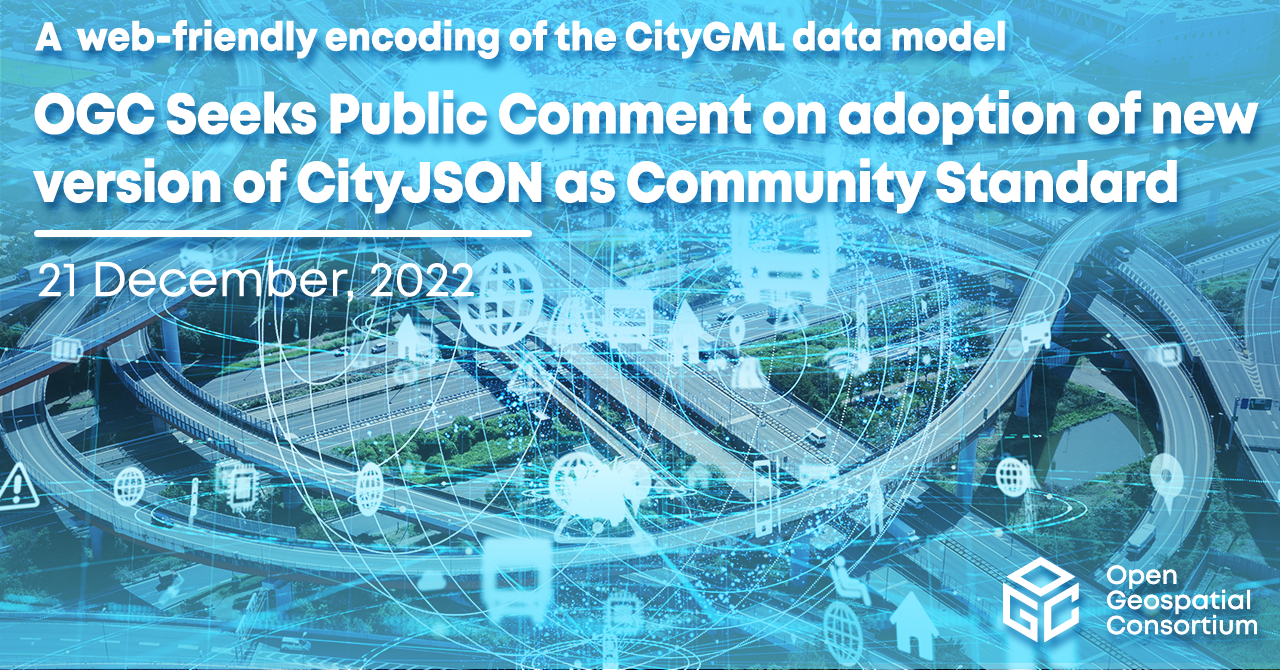OGC Seeks Public Comment on adoption of new version of CityJSON as Community Standard
CityJSON is a web-friendly encoding of the CityGML data model, which is used in Digital Twins and other uses pertaining to built and natural environments. Public comment period ends 1, February 2023.
21 December 2022: The Open Geospatial Consortium (OGC) seeks public comment on an updated version (v1.1) of the CityJSON Community Standard. Comments are due 1 February, 2023.
The CityJSON v1.1 Community Standard Justification Document outlining the many changes is available for review and comment on the OGC Portal. The complete CityJSON v1.1 specifications are available on the CityJSON website.
CityJSON defines ways to describe, in a JSON encoding, most of the common 3D features and objects found in cities (such as buildings, roads, rivers, bridges, vegetation, and city furniture) and the relationships between them. It also defines how to encode different standard levels of detail (LoDs) for the 3D objects in JSON, which allows users to represent different resolutions of objects for different applications and purposes. A list of applications and use-cases for CityJSON is available on the CityJSON website.
The aim of CityJSON is to offer an alternative to the GML encoding of CityGML, which can be verbose and therefore complex to work with. CityJSON aims at being easy-to-use, both for reading datasets, and for creating them. It was designed with programmers in mind, so that tools and APIs supporting it can be quickly built. It was also designed to be compact, typically compressing publicly available CityGML files by 6x.
A CityJSON file describes both the geometry and the semantics of the city features of a given area. A CityJSON object, representing a city, is as ‘flat’ as possible, i.e., the hierarchy of CityGML has been flattened out and only the city objects which are ‘leaves’ of this hierarchy are implemented. This considerably simplifies the storage of a city model, and furthermore does not mean that information is lost.
CityJSON v1.0 was accepted as an OGC Community standard in August 2021. CityJSON version 1.0 is a JSON-based encoding for a subset of the OGC CityGML data model version 2.0.0. The candidate version 1.1 encodes the OGC CityGML 3.0 Conceptual Model Standard.
The candidate CityJSON v1.1 standard is available for review and comment on the OGC Portal. Comments are due by DATE and should be submitted via the method outlined on the CityJSON v1.1 Community Standard’s public comment request page.
About OGC
The Open Geospatial Consortium (OGC) is a collective problem-solving community of more than 550 experts representing industry, government, research and academia, collaborating to make geospatial (location) information and services FAIR – Findable, Accessible, Interoperable, and Reusable.
The global OGC Community engages in a mix of activities related to location-based technologies: developing consensus-based open standards and best-practices; collaborating on problem solving in agile innovation initiatives; participating in member meetings, events, and workshops; and more.
OGC’s unique standards development process moves at the pace of innovation, with constant input from technology forecasting, practical prototyping, real-world testing, and community engagement.
OGC bridges disparate sectors, domains, and technology trends, and encourages the cross-pollination of ideas between different communities of practice to improve decision-making at all levels. OGC is committed to creating an inclusive and sustainable future.
Visit ogc.org for more info on our work.
“






